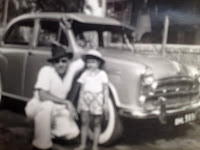Lunch Express!

At certain times of day, at daybreak, in the middle of the afternoon and again late in the night, factory shift-workers carrying their tiffin containers on their way to the Kohinoor Mills just beyond the corner of our road where it intersected with Ambedkar Road, would fill the sidewalks spilling onto the road until it looked like a human river.
And every time the work shift changed at the cotton mills, a loud siren would sound and other workers whose shifts had just ended would stream down our road in the opposite direction back towards the station. And then all would be quiet again until another train arrived and cars and taxis loaded with luggage would noisily turn the corner next to our house, speeding down Balchandra Road in the direction of Tilak Bridge.
Sometime, in between the sirens and millworker deluges, every weekday rain or shine alike, In the middle of the morning, the tiffin-carrier men - the dabbah-wallas - would arrive and park their long see-saw-like carts along the sides of our street. As a child playing on our balcony, I would watch with interest as the dabba-wallas would mop their sweaty brows with the strips of cloth they hung over their shoulders and run off to collect freshly-packed lunch-boxes from the homes of their customers that they would then hurry back to pack in bunches on their carts, looping long ropes through the handles of the tiffin carriers.
When satisfied that the arrangements were secure, they would unceremoniously run to the front of their ten- to twelve-foot long carts, bend to pick up the long handles and start off, running, nudging their carts into the stream of traffic, and disappearing into the distance. Even as a child, I noticed the constant sense of movement, they always moved quickly. No one seemed to dawdle for some reason.
I used to wonder where they went until someone explained to me that they carried and delivered these fresh homemade lunches to their customers in their offices. A few times, when we were out downtown during lunchtime in the Fort area near Churchgate where there were a lot of office buildings, I would see dozens of the long tiffin carrier carts parked at the edge and as many of the dabba-wallas hurrying about from building to building delivering the lunch-boxes. And no sooner had they completed their deliveries than they would repeat their rounds, this time, to collect the emptied boxes to take back with them.
After they had re-roped the containers to their carts, some of them would start off right away on their return trip, disappearing into the tangle of traffic. Others would find a quiet space before they set out, to take a small nap, with the strip of cloth serving as an improvised sleep mask this time. From our balcony, I would watch the dabbah-wallas return, park their carts and swiftly dispense with the chore of returning the containers to the homes that they came from. Then they would haul their empty, considerably lighter, carts back into the traffic and disappear until the next morning,
The dabba-wallas were often semi-literate young men who did not seem to have received any particular training but learned the ins and outs of their job as they went on. Today, decades later, in our technologically enhanced world, I discovered online that the more than 130 years-old practice has modernized in keeping with the changing times. Wikipedia informed me that Mumbai’s dabba-wallas have been the focus of much attention from newspapers and news-channels and stations around the world and even the subject of research at Harvard University and elsewhere.
It seems that, in addition to going high-tech with the use of online websites, SMS-texting and emails, the unionised dabba-wallas today employ a more elaborate transportation system involving bicycles and the Indian Railways in addition to the longstanding ubiquitous long crates and carts. At the same time, it remains one of the most intricate systems in the world with about 5000 dabba-wallas delivering between 175,000 and 200,000 fresh lunches daily.
In my mind’s eye, I watch these men arrive with tiffin-boxes containing hot lunches at my school for some of my classmates. They would wait sometimes impatiently for the children to finish, collect the containers and be off pushing their long carts. I realize now with the distance lent by the passage of time that all these years, it had not been evident to me at all that this had been such an unusual and special thing that it is now considered to be.
* * * * *



Comments
Post a Comment